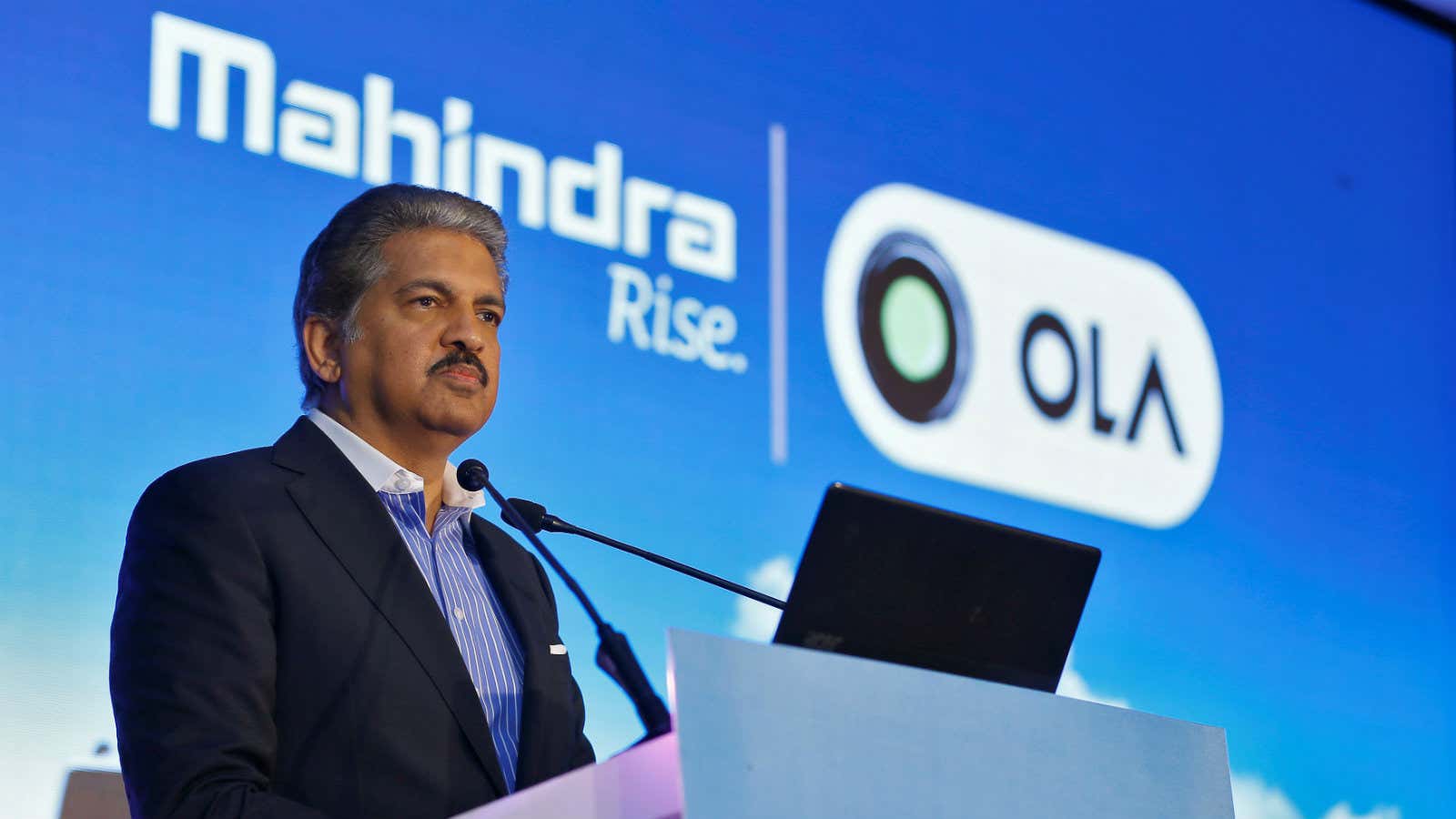Anand Mahindra believes Indian industry is at an inflection point. And he is readying his company for the future.
He is overseeing the sprouting of new-age entities under the canopy of his 71-year-old conglomerate, the Mahindra Group, with its presence in 10 sectors and annual revenues of $17.8 billion. The group chairman believes that the differences between brick & mortar, family-owned businesses currently dominating Indian industry and digital-era startups will soon vanish.
So, be it the group’s tie-up with taxi-hailing firm Ola or in-house ventures such as SmartShift, 61-year-old Mahindra’s moves are in tune with the broader thinking within the group that it should be looked at as “a collection of startups.” In an email interview with Quartz, Mahindra spoke about his vision.
Edited excerpts:
What are your views about Indian startups and why has the Mahindra Group decided to be a part of this new ecosystem?
In my view, we are at an inflection point where the line between the traditional types of businesses and new businesses will get increasingly blurred. We tend to think of them as two separate boxes with separate cultures. Perhaps that’s true today, but I don’t think it will be true for long.
To me, these changes offer a huge opportunity to harness the power of creativity of young people, and for traditional companies to create an entrepreneurial ecosystem that offers all the resources of a large company and yet mirrors the startup garage culture of Silicon Valley or Bengaluru.
Can you tell us more about some of Mahindra Group’s in-house startups?
One example is Smart Shift, which connects transporters of cargo with customers. Through an auction system, they work out mutually beneficial deals. Another of our startups is Trringo, which is revolutionising the tractor industry by enabling farmers to hire tractors for short periods of time, bringing mechanisation within the reach of every small farmer. You could think of this as an Uber for tractors.
This mindset not only brings us into the digital world but also enables us to cost effectively meet the needs of underserved communities and to penetrate underserved markets.
We have an internal private equity arm, Mahindra Partners, that spearheads the group’s investments in new firms and startup businesses.
Is your collaboration with Ola a part of that strategy?
Definitely! This is the kind of unconventional thinking that will enable us to participate in the digital revolution. As I have often said, acceptance of the idea of shared mobility is going to be one of the major disruptive trends in the automotive industry. The market will evolve into two segments: cars that provide ease of access to transport and are shared by many people, and cars that are exclusive high-end symbols of the owner’s status and aspirations.
Collaborations like these are the Mahindra Group’s first footsteps into the shared economy, and an opportunity to meet the needs of millennials for whom access to transport is far more important than ownership of the means of transport. This doesn’t mean we will stop manufacturing vehicles. It opens up an entirely new avenue to innovatively profit from the manufacturing of vehicles.
Do you think business groups should change the way they think and strategise?
Obviously! Disruption is the name of the game, and, it’s happening even as we speak. In service industries, businesses like Uber and AirBnB seem to have come up from nowhere to change and dominate the market—and we have to learn to collaborate as well as compete.
In manufacturing, products have longer development cycles. In that arena, there is a need to first develop products that meet (the hitherto) unmet needs of consumers and, second, to stop thinking of ourselves as islands and leverage collaboration, aggregation, platforms, and whatever opportunities this new world offers to engage with customers and sell our products.
Whether in services or in manufacturing, the trick is to stay ahead of the curve. I believe we should not wait to be disrupted—we should become disruptors ourselves.
Can you tell us about the driverless tractors that your group is currently developing?
I think it’s an idea whose time has come. I strongly believe the most fertile ground for autonomous mobility is the agricultural sector. This is something that has not been emphasised enough globally. There are many reasons for this.
It’s a ring-fenced sort of activity, where paranoia about accidents and collisions is virtually non-existent; much easier to execute than autonomous cars. It could be a game-changer for productivity. Autonomous tractors would enable a farmer to focus on the work that matters the most on a farm.
We are driven by the belief that driverless tractors can lead to a disruption in the Indian farm industry and perhaps in the developing countries.
We will, of course, commercialise a driverless tractor in phases—from a partially-automated to a highly-automated to a driverless one. We have the in-house technologies and we will use the ones that make sense for our Indian farms.
Once we do this, the next challenge is ensuring that our farmers can access this technology. This calls for new business models. And that’s where startup businesses like Trringo come in.
Will we see increased expenditure towards R&D?
We are already at par with global players when you consider our R&D spends as a percentage of turnover, which was at 4.7% in the 2016 fiscal.
